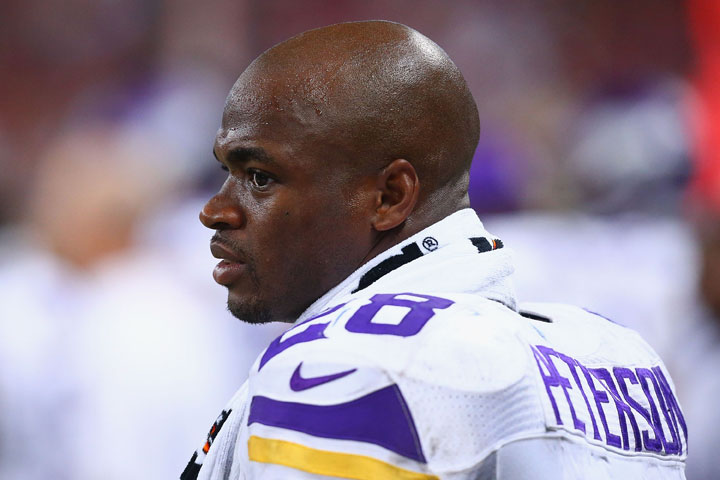TORONTO – When NFL star Adrian Peterson was charged with using a branch or “switch” to spank his four-year-old son, he “never ever intended to harm” him, and was using his judgment as a parent to discipline his son, according to a statement he tweeted Monday afternoon.

Booked and released on $15,000 bond Saturday, the Minnesota Vikings announced Monday that Peterson would be back on the field in six days. The team says it wants the legal process to take its course before making any final decisions on the running back’s future.
So what are the legalities around using corporal punishment? Turns out there’s a significant difference between Canada and the United States.
“As interpreted by the Supreme Court of Canada, the court has held that any use of an object, would be in-and-of-itself it would be the criminal offence of assault and a defence of so-called use of reasonable force for the purpose of correction is not a defence in Canada,” said Queen’s law professor Nicholas Bala.
“So from what we know through the media reports [that he used a switch] he would not have a defence in Canada; he would be convicted.”
Section 43 of Canada’s Criminal Code reads: “Every schoolteacher, parent or person standing in the place of a parent is justified in using force by way of correction toward a pupil or child, as the case may be, who is under his care, if the force does not exceed what is reasonable under the circumstances.”
University of Toronto psychology professor Gary Walters studies discipline and corporal punishment in childrearing, and explains the line is crossed when visible bodily damage is done—but notes it can be a fuzzy line.
Though he allegedly left visible damage on his son’s body, Bala suggested Peterson is less likely to be convicted in the United States, where there is both a broader scope for parental discipline, and more tolerance of corporal punishment in general than north of the border.
Watch below: Global’s Vassy Kapelos reports on NFL star Adrian Peterson’s indictment for allegedly physically abusing his son.
But there are many factors that can impact sentencing in such a case: Whether they’ve otherwise been a good parent, how seriously the child is injured, if the parent demonstrates an understanding and regret of the incident and participates in a parenting course would all affect the legal outcomes.
In Peterson’s case, there’s the added layer of the regulatory process imposed by the NFL. This applies to many professional groups including teachers, lawyers, and doctors; Bala says there’s a so-called morals clause in professional athletes’ contracts, which allows them to suspend or expel the person in question.
And some believe the case presents an opportunity for the NFL to go beyond benching its players.
The need for education on how to discipline children is something Dr. Emalee Flaherty deals with in her work detecting and preventing child maltreatment at the Ann & Robert H. Lurie Children’s Hospital of Chicago.
“Corporal punishment gives such a bad message to children,” said Flaherty, who also teaches pediatrics at Northwestern University’s Feinberg School of Medicine. “It’s like saying bullying is okay, because you’re teaching your child that if you’re much bigger than somebody else, you can hurt them to make them do what you want them to do.”
- B.C. Sikh leader ‘vindicated’ by arrest of Indian nationals in Nijjar killing
- London Drugs remains closed, says it is reviewing billions of lines of data
- How toy guns brandished by Ontario youth in ‘assassins game’ is prompting real fear
- Trump trial hears recording discussing hush money scheme: ‘What do we got to pay?’
Flaherty said her treatment plans involve helping parents get resources they need to manage their own anger issues and deal with stressors, including factors known to be linked with child abuse: domestic violence, substance abuse, poverty, lack of sleep, financial strain, and anything that places more stress on a family.
Alan Leschied, a psychologist and professor in the Faculty of Education at the University of Western Ontario, believes the use of corporal punishment is a reflection of a lack of parenting abilities rather than a way to manage child behaviour.
“Typically if you ask parents who have disciplined their child corporally—like with a switch or using a physical means—they’ll say that it’s got less to do with child management, and it’s got more to do with their own frustration,” said Leschied, who has worked in children’s mental health since 1977.
“And so why the higher incidence of those who endorse corporal punishment around discipline extends into abuse is because these are adults or parents who don’t have enough impulse control, or don’t know enough alternatives to know how to manage a child’s behaviour to know what to do beyond using some form of corporal means that can leave bruises or scarring.”
It’s one area where Peterson himself seems to be addressing. In his statement, he said he’s since met with a psychologist and learned “there are other alternative ways of disciplining a child that may be more appropriate.”
“I love my son very much and I will continue to try to become a better father and person.”


Comments